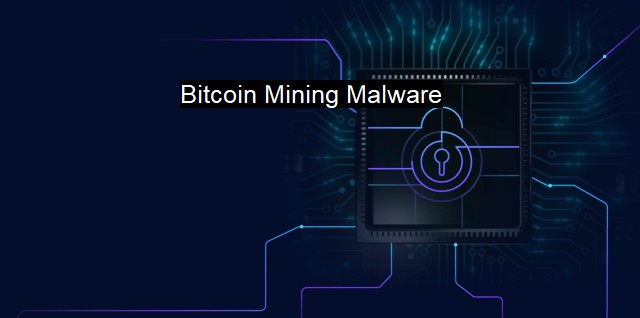What is Bitcoin Mining Malware?
Understanding Bitcoin Mining Malware: How Criminals Exploit Victims' Devices to Illegally Mine Cryptocurrency
Bitcoin mining malware is a type of malicious software that hackers install on a victim's computer to mine Bitcoin without the user's consent or knowledge. Such malware typically invades a user's computer through deceptive techniques such as phishing, hiding in seemingly legitimate software downloads, or compromising website security. Bitcoin mining malware exploits a computer's power and resources to perform tasks related to Bitcoin mining while surreptitiously getting embedded deep within the system infrastructure to maintain a low profile.Bitcoin mining is a process that involves verifying Bitcoin transactions and adding them to the public ledger or blockchain. This process requires substantial computational power and energy due to its complex mathematical calculations. Fraudsters misuse Bitcoin mining by infiltrating a computer or a network of computers, using their processing power to mine Bitcoins.
Bitcoin mining malware goes beyond simple petty theft – it can utilize vast resources of a corporate network or even an entire botnet to mine Bitcoin on a significant scale. Its clandestine operation often masks a part of this criminal underground, where resources are manipulated and capital is stolen underneath user's noses.
The consequences for infected users or networks can be severe. Decreased system and network performance, plus increased power consumption, are may tell-tale signs of Bitcoin mining malware. Continual operation of such malware silently eating up system resources can also cause systems to overheat, leading to their premature failure.
Avoiding such threats requires a robust cybersecurity strategy, including installing reputable antivirus software, keeping systems and software up-to-date with the latest patches, and monitoring system for signs of unusual or increased power usage. Antivirus software is particularly effective against Bitcoin mining malware as it continually scans for, contain, and eradicate every trace of any potential threat.
Many advanced forms of Bitcoin mining malware are designed to be stealthy and elusive — evading identification from standard antivirus software. Therefore, more specialized technology might be needed for detection and extermination. For instance, anti-malware software often is equipped with functionality explicitly designed to detect and remove Bitcoin mining malware.
User awareness and education are essential in combating such threats. Users should be advised against clicking on suspicious email attachments, avoiding unsolicited software downloads, and encouraged to research software or files before downloading them onto their systems.
Stricter network security measures can effectively counteract Bitcoin mining malware threats targeting network infrastructures. Any connection anomalies, suspicious network activities, or unexpected spikes in processing power should raise immediate red flags and lead to a comprehensive system check.
Bitcoin mining malware is a significant cybersecurity threat that leverages the processing capability and power of unsuspecting users' systems to mine Bitcoins. Victims often suffer from decreased system performance and increased energy usage. Fighting this threat necessitates a combination of reputable antivirus and anti-malware software, strict network security protocols, system and software updates, and robust end-user education.
Adopting and implementing these measures can protect systems and users from Bitcoin mining malware, ensuring the digital world's safety and security. Similarly, these preventive measures will also shield users from other forms of malware and cyberattacks prevalent in the digital age. Therefore, one's cybersecurity hygiene must always remain a priority, as every click, download, or email can potentially be the backdoor a malicious hacker needs to gain unauthorized access.

Bitcoin Mining Malware FAQs
What is bitcoin mining malware?
Bitcoin mining malware is a type of malicious software that infects a computer or network and uses its resources to mine cryptocurrencies like Bitcoin without the owner's knowledge or consent.How does bitcoin mining malware spread?
Bitcoin mining malware can spread through several different methods, including phishing emails, malicious ads, drive-by downloads, and unpatched vulnerabilities in software and operating systems.What are the risks of bitcoin mining malware?
Bitcoin mining malware can slow down or crash the infected computer or network, increase electricity bills, and compromise sensitive data stored on the device or network. It can also be used as a backdoor to install other types of malware or launch cyber attacks.How can I protect myself from bitcoin mining malware?
To protect yourself from bitcoin mining malware, you should keep your antivirus and software up to date, be careful with emails and downloads from unknown sources, avoid clicking on suspicious links or ads, and consider using ad blockers and anti-malware software. It's also important to monitor your computer's performance and resource usage regularly to detect any unusual activity.| | A | | | B | | | C | | | D | | | E | | | F | | | G | | | H | | | I | | | J | | | K | | | L | | | M | |
| | N | | | O | | | P | | | Q | | | R | | | S | | | T | | | U | | | V | | | W | | | X | | | Y | | | Z | |
| | 1 | | | 2 | | | 3 | | | 4 | | | 7 | | | 8 | | |||||||